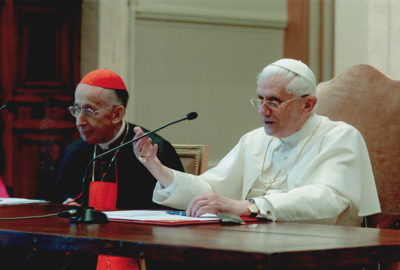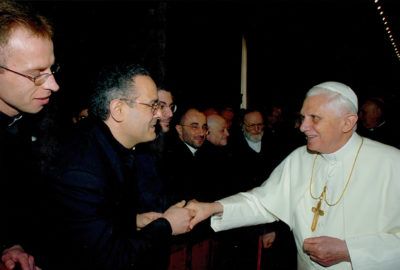Meeting of parish priests and clergy of Rome 2-22-2007
Benedict XVI
Vatican – Hall of Blessings, February 22, 2007 *
During the annual meeting
the Holy Father Benedict XVI with the clergy of his diocese of Rome, where the
possibility for some parish priests to ask questions and obtain
answers of the Pope, to a parish priest who asked about how to insert himself
better to develop a ministry of unity in the universal Church, the
Pope has responded speaking also of the Neocatechumenal Way, of the
knowledge that he personally has and of its Statute.
The theme of the Ecclesial Movements and the New Communities,
as a providential gift for our times, it has been proposed by the
Father Gerardo Raúl Carcar, belonging to the community of the Fathers of
Schönstatt, arrived in Rome in September 2006 from Argentina and today
is cooperating vicar of the parish of San Jerónimo a Corviale. It is about
the realities that have a creative impulse, live the faith and seek
new ways of life to find a proper missionary placement in
the Church. The religious has asked the Pope for advice on how
to be inserted to really develop a ministry of unity in the
universal Church.

Response of the Pope:
“So I see that I must be briefer. Thank you for your question. I think you
mentioned the essential sources of all that we can say about
Movements. In this sense, your question is also an answer.
I would like to explain immediately that in recent months
I have been receiving the Italian Bishops on their ad limina visits and so have
been able to find out a little more about the geography of the faith in Italy. I see many very beautiful things
together with the problems that we all know. I see above all
that the faith is still deeply rooted in the Italian heart
even if, of course, it is threatened in many ways
by today’s situations. The Movements also welcome my fatherly
role as Pastor. Others are more critical and say
that Movements are out of place. I think, in fact, that situations
differ and everything depends on the people in question.
It seems to me that we have two fundamental rules of which you spoke. The first was given to us by St Paul in his First Letter to the Thessalonians: do not extinguish charisms. If the Lord gives us new gifts we must be grateful, even if at times they may be inconvenient. And it is beautiful that without an initiative of the hierarchy but with an initiative from below, as people say, but which also truly comes from on High, that is, as a gift of the Holy Spirit, new forms of life are being born in the Church just as, moreover, they were born down the ages.
At first, they were always
inconvenient. Even St Francis was very inconvenient, and it was very hard for the Pope
to give a final canonical form to a
reality that by far exceeded legal norms. For St Francis, it was
a very great sacrifice to let himself be lodged in this juridical framework,
but in the end this gave rise to a reality that is still alive today and will live on
in the future: it gives strength, as well as new elements, to the Church’s life.
I wish to say only this: Movements have been born in all the centuries.
Even St Benedict at the outset was a Movement. They do not become
part of the Church’s life without suffering and difficulty. St Benedict himself
had to correct the initial direction that monasticism was taking. Thus, in our century too,
the Lord, the Holy Spirit, has given us new initiatives with new
aspects of Christian life. Since they are lived by
human people with their limitations, they also create difficulties.
So the first rule is: do not extinguish
Christian charisms; be grateful even if they are inconvenient. The second rule
is: the Church is one; if Movements are truly gifts
of the Holy Spirit, they belong to and serve the Church and in patient dialogue
between Pastors and Movements, a fruitful form is born where
these elements become edifying for the Church today
and in the future.
This dialogue is at all levels. Starting with the
parish priest, the Bishops and the Successor of Peter, the search for
appropriate structures is underway: in many cases it has already borne fruit.
In others, we are still studying. For example, we ask ourselves whether,
after five years of experience, it is possible to confirm definitively
the Statutes for the Neocatechumenal Way, whether a trial period is
necessary or whether, perhaps, certain elements of
this structure need perfecting.
In any case, I knew the Neocatechumens from the very outset. It was
a long Way, with many complications that still exist today,
but we have found an ecclesial form that has already vastly improved the
relationship between the Pastor and the Way. We are going ahead like this! The same
can be said for other Movements.
Now, as a synthesis of the two fundamental rules, I would say: gratitude, patience and also acceptance of the inevitable sufferings. In marriage too, there is always suffering and tension. Yet, the couple goes forward and thus true love matures. The same thing happens in the Church’s communities: let us be patient together. The different levels of the hierarchy too – from the parish priest to the Bishop, to the Supreme Pontiff – must continually exchange ideas with one another, they must foster dialogue to find together the best road. The experiences of parish priests are fundamental and so are the experiences of the Bishop, and let us say, the universal perspectives of the Pope have a theological and pastoral place of their own in the Church.

On the one hand, these different levels of the hierarchy as a whole and on the other, all life as it is lived in the parish context with patience and openness in obedience to the Lord, really create new vitality in the Church.
Let us be grateful to the Holy Spirit for the gifts he has given to us. Let us be obedient to the voice of the Spirit, but also clear in integrating these elements into our life; lastly, this criterion serves the concrete Church and thus patiently, courageously and generously, the Lord will certainly guide and help us.”
(*) Cfr. «L’Osservatore Romano», 24 February 2007.